Applying Ethical Theories to Online Data Collection in IT Ethics
VerifiedAdded on 2023/06/07
|8
|1939
|228
Essay
AI Summary
This essay explores the ethical dimensions of data collection, particularly in the context of "harvesting" personalities online, using four prominent ethical theories: utilitarianism, deontology, contract theory, and virtue theory. It delves into a case study reminiscent of the Cambridge Analytica scandal, examining the ethical implications of collecting and using personal data for targeted advertising and political manipulation. The essay discusses how each ethical theory provides a unique lens through which to analyze the rightness or wrongness of such actions, emphasizing the importance of data privacy, transparency, and the alignment of organizational goals with societal well-being. It concludes by stressing the need for robust security measures and ethical awareness to prevent data breaches and protect individuals from the potential harms of data misuse, suggesting that companies must prioritize ethical conduct to maintain long-term sustainability and societal trust. Desklib offers a wide range of academic resources, including solved assignments and past papers, to support students in their studies.
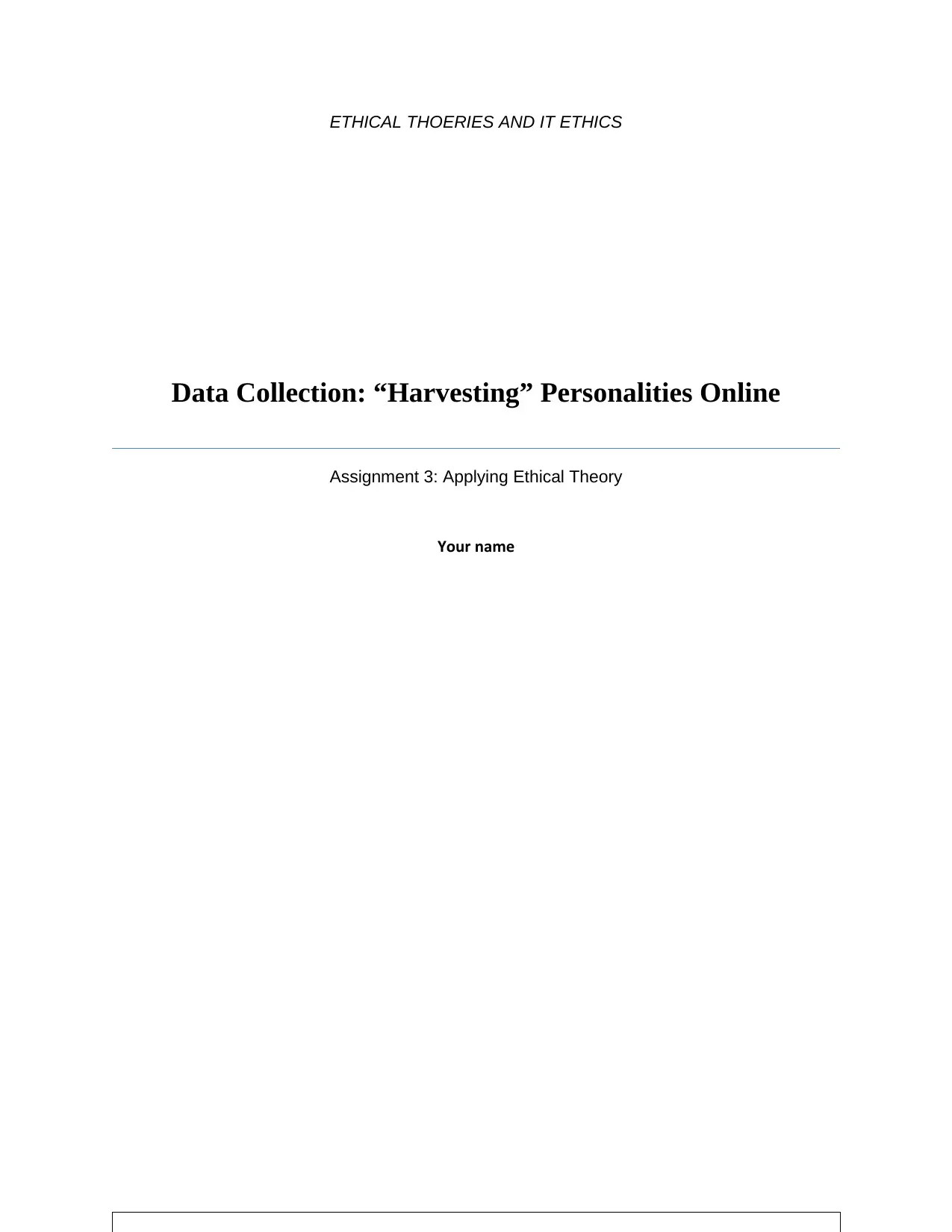
ETHICAL THOERIES AND IT ETHICS
Data Collection: “Harvesting” Personalities Online
Assignment 3: Applying Ethical Theory
Your name
Data Collection: “Harvesting” Personalities Online
Assignment 3: Applying Ethical Theory
Your name
Paraphrase This Document
Need a fresh take? Get an instant paraphrase of this document with our AI Paraphraser
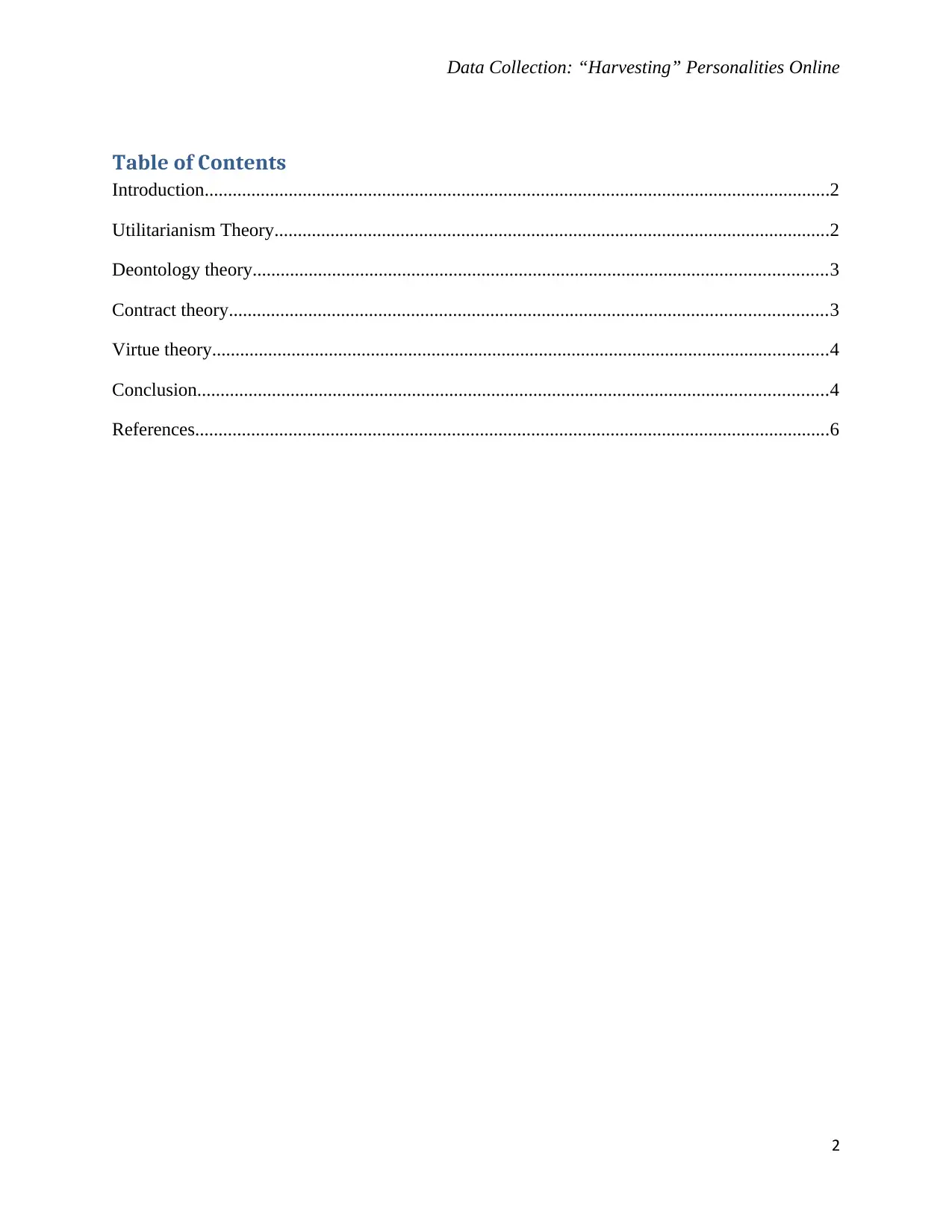
Data Collection: “Harvesting” Personalities Online
Table of Contents
Introduction......................................................................................................................................2
Utilitarianism Theory.......................................................................................................................2
Deontology theory...........................................................................................................................3
Contract theory................................................................................................................................3
Virtue theory....................................................................................................................................4
Conclusion.......................................................................................................................................4
References........................................................................................................................................6
2
Table of Contents
Introduction......................................................................................................................................2
Utilitarianism Theory.......................................................................................................................2
Deontology theory...........................................................................................................................3
Contract theory................................................................................................................................3
Virtue theory....................................................................................................................................4
Conclusion.......................................................................................................................................4
References........................................................................................................................................6
2
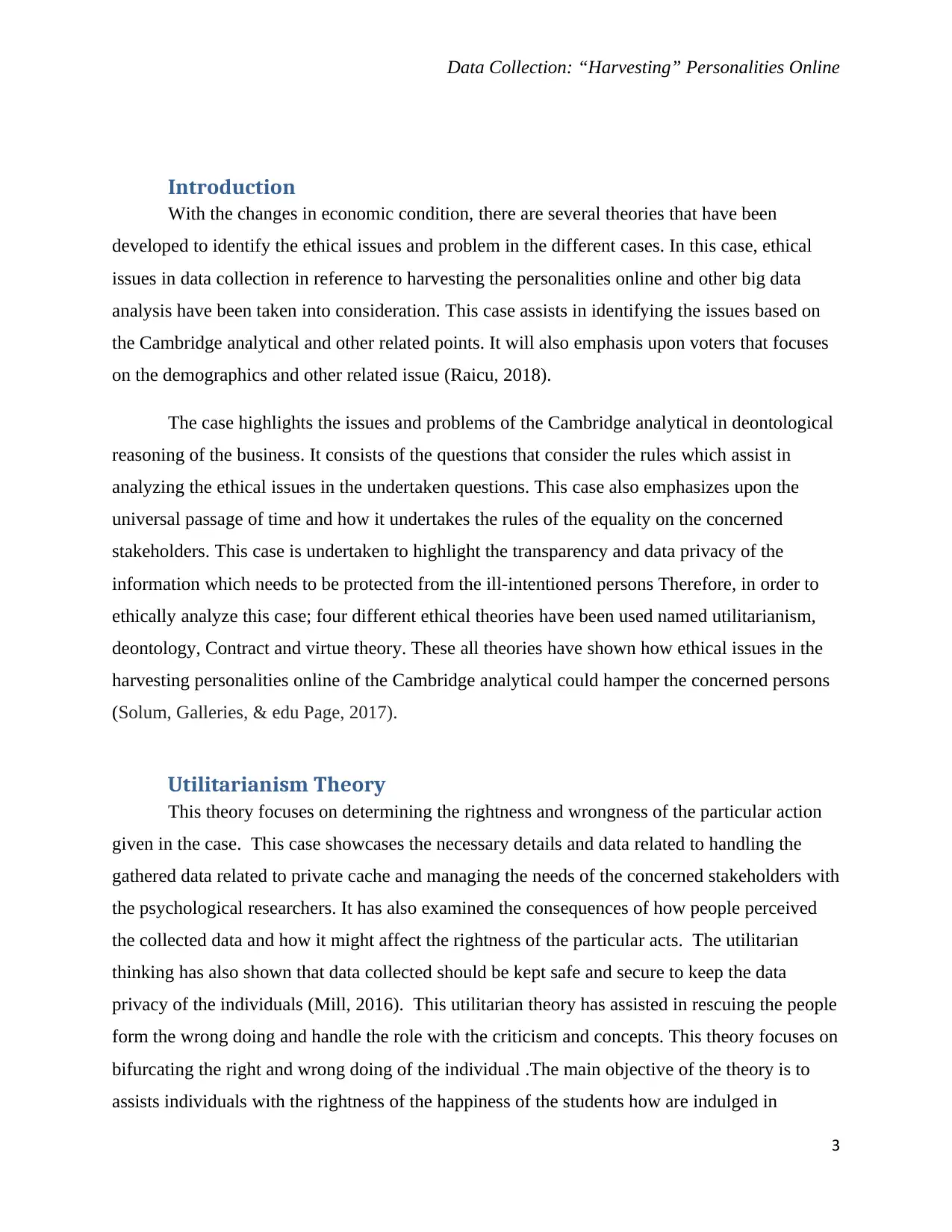
Data Collection: “Harvesting” Personalities Online
Introduction
With the changes in economic condition, there are several theories that have been
developed to identify the ethical issues and problem in the different cases. In this case, ethical
issues in data collection in reference to harvesting the personalities online and other big data
analysis have been taken into consideration. This case assists in identifying the issues based on
the Cambridge analytical and other related points. It will also emphasis upon voters that focuses
on the demographics and other related issue (Raicu, 2018).
The case highlights the issues and problems of the Cambridge analytical in deontological
reasoning of the business. It consists of the questions that consider the rules which assist in
analyzing the ethical issues in the undertaken questions. This case also emphasizes upon the
universal passage of time and how it undertakes the rules of the equality on the concerned
stakeholders. This case is undertaken to highlight the transparency and data privacy of the
information which needs to be protected from the ill-intentioned persons Therefore, in order to
ethically analyze this case; four different ethical theories have been used named utilitarianism,
deontology, Contract and virtue theory. These all theories have shown how ethical issues in the
harvesting personalities online of the Cambridge analytical could hamper the concerned persons
(Solum, Galleries, & edu Page, 2017).
Utilitarianism Theory
This theory focuses on determining the rightness and wrongness of the particular action
given in the case. This case showcases the necessary details and data related to handling the
gathered data related to private cache and managing the needs of the concerned stakeholders with
the psychological researchers. It has also examined the consequences of how people perceived
the collected data and how it might affect the rightness of the particular acts. The utilitarian
thinking has also shown that data collected should be kept safe and secure to keep the data
privacy of the individuals (Mill, 2016). This utilitarian theory has assisted in rescuing the people
form the wrong doing and handle the role with the criticism and concepts. This theory focuses on
bifurcating the right and wrong doing of the individual .The main objective of the theory is to
assists individuals with the rightness of the happiness of the students how are indulged in
3
Introduction
With the changes in economic condition, there are several theories that have been
developed to identify the ethical issues and problem in the different cases. In this case, ethical
issues in data collection in reference to harvesting the personalities online and other big data
analysis have been taken into consideration. This case assists in identifying the issues based on
the Cambridge analytical and other related points. It will also emphasis upon voters that focuses
on the demographics and other related issue (Raicu, 2018).
The case highlights the issues and problems of the Cambridge analytical in deontological
reasoning of the business. It consists of the questions that consider the rules which assist in
analyzing the ethical issues in the undertaken questions. This case also emphasizes upon the
universal passage of time and how it undertakes the rules of the equality on the concerned
stakeholders. This case is undertaken to highlight the transparency and data privacy of the
information which needs to be protected from the ill-intentioned persons Therefore, in order to
ethically analyze this case; four different ethical theories have been used named utilitarianism,
deontology, Contract and virtue theory. These all theories have shown how ethical issues in the
harvesting personalities online of the Cambridge analytical could hamper the concerned persons
(Solum, Galleries, & edu Page, 2017).
Utilitarianism Theory
This theory focuses on determining the rightness and wrongness of the particular action
given in the case. This case showcases the necessary details and data related to handling the
gathered data related to private cache and managing the needs of the concerned stakeholders with
the psychological researchers. It has also examined the consequences of how people perceived
the collected data and how it might affect the rightness of the particular acts. The utilitarian
thinking has also shown that data collected should be kept safe and secure to keep the data
privacy of the individuals (Mill, 2016). This utilitarian theory has assisted in rescuing the people
form the wrong doing and handle the role with the criticism and concepts. This theory focuses on
bifurcating the right and wrong doing of the individual .The main objective of the theory is to
assists individuals with the rightness of the happiness of the students how are indulged in
3
⊘ This is a preview!⊘
Do you want full access?
Subscribe today to unlock all pages.

Trusted by 1+ million students worldwide
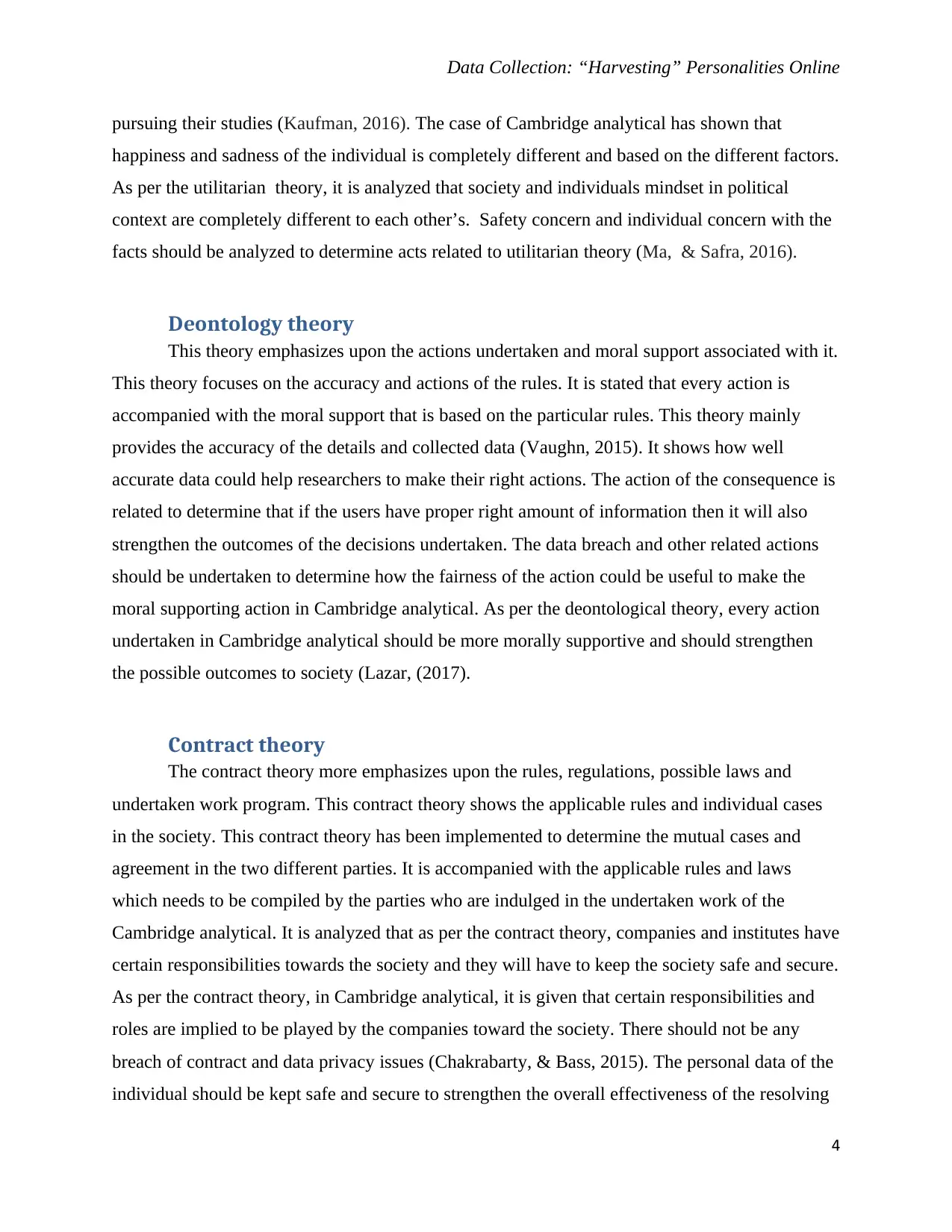
Data Collection: “Harvesting” Personalities Online
pursuing their studies (Kaufman, 2016). The case of Cambridge analytical has shown that
happiness and sadness of the individual is completely different and based on the different factors.
As per the utilitarian theory, it is analyzed that society and individuals mindset in political
context are completely different to each other’s. Safety concern and individual concern with the
facts should be analyzed to determine acts related to utilitarian theory (Ma, & Safra, 2016).
Deontology theory
This theory emphasizes upon the actions undertaken and moral support associated with it.
This theory focuses on the accuracy and actions of the rules. It is stated that every action is
accompanied with the moral support that is based on the particular rules. This theory mainly
provides the accuracy of the details and collected data (Vaughn, 2015). It shows how well
accurate data could help researchers to make their right actions. The action of the consequence is
related to determine that if the users have proper right amount of information then it will also
strengthen the outcomes of the decisions undertaken. The data breach and other related actions
should be undertaken to determine how the fairness of the action could be useful to make the
moral supporting action in Cambridge analytical. As per the deontological theory, every action
undertaken in Cambridge analytical should be more morally supportive and should strengthen
the possible outcomes to society (Lazar, (2017).
Contract theory
The contract theory more emphasizes upon the rules, regulations, possible laws and
undertaken work program. This contract theory shows the applicable rules and individual cases
in the society. This contract theory has been implemented to determine the mutual cases and
agreement in the two different parties. It is accompanied with the applicable rules and laws
which needs to be compiled by the parties who are indulged in the undertaken work of the
Cambridge analytical. It is analyzed that as per the contract theory, companies and institutes have
certain responsibilities towards the society and they will have to keep the society safe and secure.
As per the contract theory, in Cambridge analytical, it is given that certain responsibilities and
roles are implied to be played by the companies toward the society. There should not be any
breach of contract and data privacy issues (Chakrabarty, & Bass, 2015). The personal data of the
individual should be kept safe and secure to strengthen the overall effectiveness of the resolving
4
pursuing their studies (Kaufman, 2016). The case of Cambridge analytical has shown that
happiness and sadness of the individual is completely different and based on the different factors.
As per the utilitarian theory, it is analyzed that society and individuals mindset in political
context are completely different to each other’s. Safety concern and individual concern with the
facts should be analyzed to determine acts related to utilitarian theory (Ma, & Safra, 2016).
Deontology theory
This theory emphasizes upon the actions undertaken and moral support associated with it.
This theory focuses on the accuracy and actions of the rules. It is stated that every action is
accompanied with the moral support that is based on the particular rules. This theory mainly
provides the accuracy of the details and collected data (Vaughn, 2015). It shows how well
accurate data could help researchers to make their right actions. The action of the consequence is
related to determine that if the users have proper right amount of information then it will also
strengthen the outcomes of the decisions undertaken. The data breach and other related actions
should be undertaken to determine how the fairness of the action could be useful to make the
moral supporting action in Cambridge analytical. As per the deontological theory, every action
undertaken in Cambridge analytical should be more morally supportive and should strengthen
the possible outcomes to society (Lazar, (2017).
Contract theory
The contract theory more emphasizes upon the rules, regulations, possible laws and
undertaken work program. This contract theory shows the applicable rules and individual cases
in the society. This contract theory has been implemented to determine the mutual cases and
agreement in the two different parties. It is accompanied with the applicable rules and laws
which needs to be compiled by the parties who are indulged in the undertaken work of the
Cambridge analytical. It is analyzed that as per the contract theory, companies and institutes have
certain responsibilities towards the society and they will have to keep the society safe and secure.
As per the contract theory, in Cambridge analytical, it is given that certain responsibilities and
roles are implied to be played by the companies toward the society. There should not be any
breach of contract and data privacy issues (Chakrabarty, & Bass, 2015). The personal data of the
individual should be kept safe and secure to strengthen the overall effectiveness of the resolving
4
Paraphrase This Document
Need a fresh take? Get an instant paraphrase of this document with our AI Paraphraser
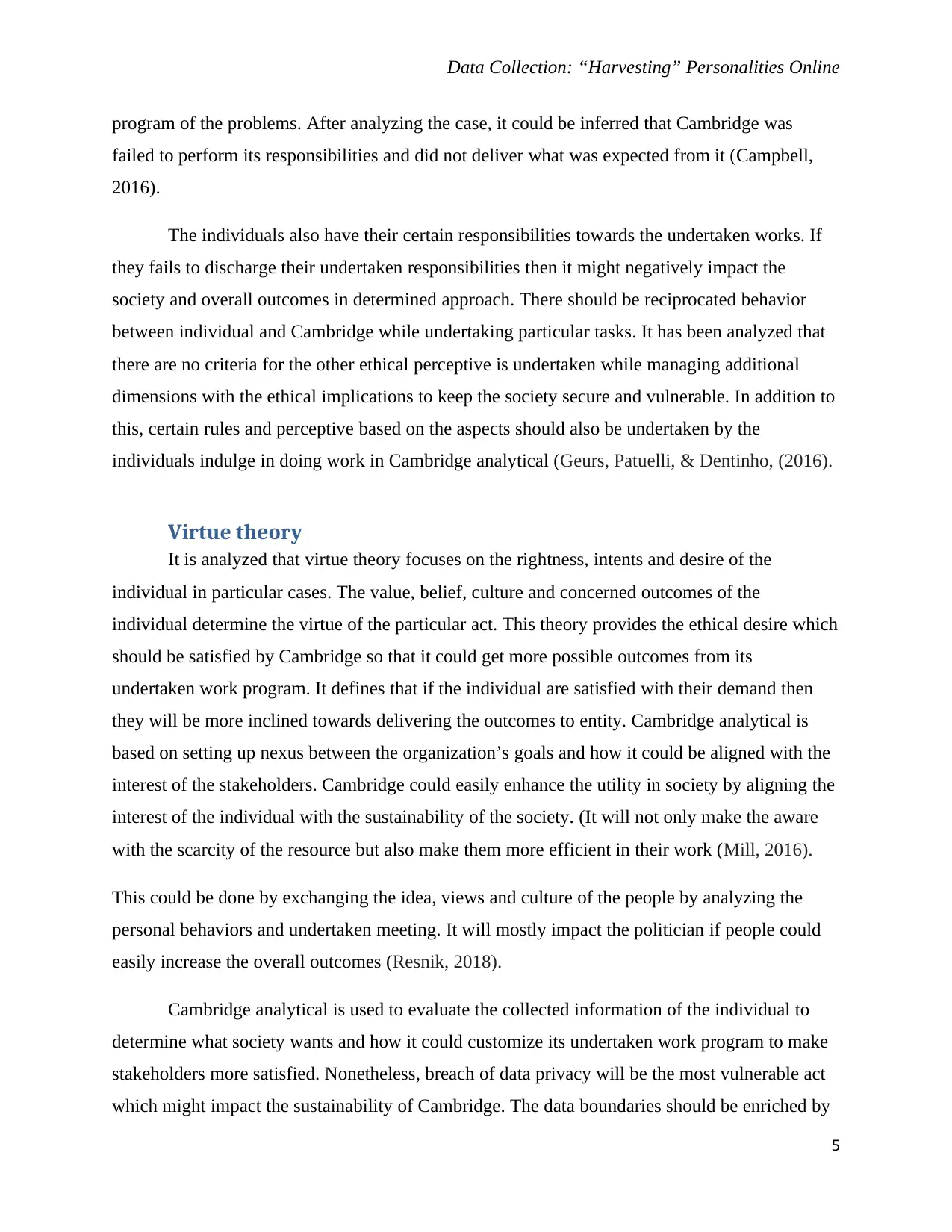
Data Collection: “Harvesting” Personalities Online
program of the problems. After analyzing the case, it could be inferred that Cambridge was
failed to perform its responsibilities and did not deliver what was expected from it (Campbell,
2016).
The individuals also have their certain responsibilities towards the undertaken works. If
they fails to discharge their undertaken responsibilities then it might negatively impact the
society and overall outcomes in determined approach. There should be reciprocated behavior
between individual and Cambridge while undertaking particular tasks. It has been analyzed that
there are no criteria for the other ethical perceptive is undertaken while managing additional
dimensions with the ethical implications to keep the society secure and vulnerable. In addition to
this, certain rules and perceptive based on the aspects should also be undertaken by the
individuals indulge in doing work in Cambridge analytical (Geurs, Patuelli, & Dentinho, (2016).
Virtue theory
It is analyzed that virtue theory focuses on the rightness, intents and desire of the
individual in particular cases. The value, belief, culture and concerned outcomes of the
individual determine the virtue of the particular act. This theory provides the ethical desire which
should be satisfied by Cambridge so that it could get more possible outcomes from its
undertaken work program. It defines that if the individual are satisfied with their demand then
they will be more inclined towards delivering the outcomes to entity. Cambridge analytical is
based on setting up nexus between the organization’s goals and how it could be aligned with the
interest of the stakeholders. Cambridge could easily enhance the utility in society by aligning the
interest of the individual with the sustainability of the society. (It will not only make the aware
with the scarcity of the resource but also make them more efficient in their work (Mill, 2016).
This could be done by exchanging the idea, views and culture of the people by analyzing the
personal behaviors and undertaken meeting. It will mostly impact the politician if people could
easily increase the overall outcomes (Resnik, 2018).
Cambridge analytical is used to evaluate the collected information of the individual to
determine what society wants and how it could customize its undertaken work program to make
stakeholders more satisfied. Nonetheless, breach of data privacy will be the most vulnerable act
which might impact the sustainability of Cambridge. The data boundaries should be enriched by
5
program of the problems. After analyzing the case, it could be inferred that Cambridge was
failed to perform its responsibilities and did not deliver what was expected from it (Campbell,
2016).
The individuals also have their certain responsibilities towards the undertaken works. If
they fails to discharge their undertaken responsibilities then it might negatively impact the
society and overall outcomes in determined approach. There should be reciprocated behavior
between individual and Cambridge while undertaking particular tasks. It has been analyzed that
there are no criteria for the other ethical perceptive is undertaken while managing additional
dimensions with the ethical implications to keep the society secure and vulnerable. In addition to
this, certain rules and perceptive based on the aspects should also be undertaken by the
individuals indulge in doing work in Cambridge analytical (Geurs, Patuelli, & Dentinho, (2016).
Virtue theory
It is analyzed that virtue theory focuses on the rightness, intents and desire of the
individual in particular cases. The value, belief, culture and concerned outcomes of the
individual determine the virtue of the particular act. This theory provides the ethical desire which
should be satisfied by Cambridge so that it could get more possible outcomes from its
undertaken work program. It defines that if the individual are satisfied with their demand then
they will be more inclined towards delivering the outcomes to entity. Cambridge analytical is
based on setting up nexus between the organization’s goals and how it could be aligned with the
interest of the stakeholders. Cambridge could easily enhance the utility in society by aligning the
interest of the individual with the sustainability of the society. (It will not only make the aware
with the scarcity of the resource but also make them more efficient in their work (Mill, 2016).
This could be done by exchanging the idea, views and culture of the people by analyzing the
personal behaviors and undertaken meeting. It will mostly impact the politician if people could
easily increase the overall outcomes (Resnik, 2018).
Cambridge analytical is used to evaluate the collected information of the individual to
determine what society wants and how it could customize its undertaken work program to make
stakeholders more satisfied. Nonetheless, breach of data privacy will be the most vulnerable act
which might impact the sustainability of Cambridge. The data boundaries should be enriched by
5
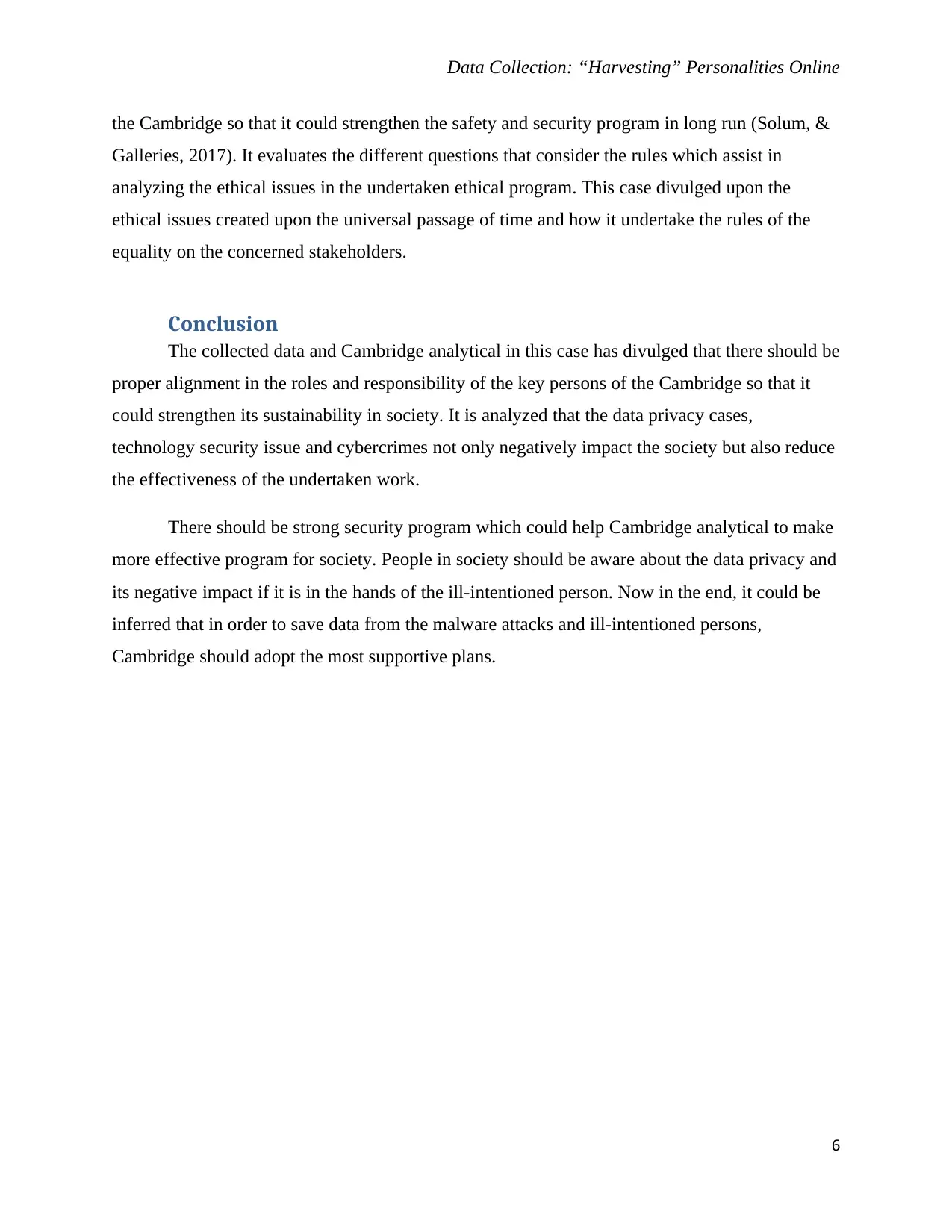
Data Collection: “Harvesting” Personalities Online
the Cambridge so that it could strengthen the safety and security program in long run (Solum, &
Galleries, 2017). It evaluates the different questions that consider the rules which assist in
analyzing the ethical issues in the undertaken ethical program. This case divulged upon the
ethical issues created upon the universal passage of time and how it undertake the rules of the
equality on the concerned stakeholders.
Conclusion
The collected data and Cambridge analytical in this case has divulged that there should be
proper alignment in the roles and responsibility of the key persons of the Cambridge so that it
could strengthen its sustainability in society. It is analyzed that the data privacy cases,
technology security issue and cybercrimes not only negatively impact the society but also reduce
the effectiveness of the undertaken work.
There should be strong security program which could help Cambridge analytical to make
more effective program for society. People in society should be aware about the data privacy and
its negative impact if it is in the hands of the ill-intentioned person. Now in the end, it could be
inferred that in order to save data from the malware attacks and ill-intentioned persons,
Cambridge should adopt the most supportive plans.
6
the Cambridge so that it could strengthen the safety and security program in long run (Solum, &
Galleries, 2017). It evaluates the different questions that consider the rules which assist in
analyzing the ethical issues in the undertaken ethical program. This case divulged upon the
ethical issues created upon the universal passage of time and how it undertake the rules of the
equality on the concerned stakeholders.
Conclusion
The collected data and Cambridge analytical in this case has divulged that there should be
proper alignment in the roles and responsibility of the key persons of the Cambridge so that it
could strengthen its sustainability in society. It is analyzed that the data privacy cases,
technology security issue and cybercrimes not only negatively impact the society but also reduce
the effectiveness of the undertaken work.
There should be strong security program which could help Cambridge analytical to make
more effective program for society. People in society should be aware about the data privacy and
its negative impact if it is in the hands of the ill-intentioned person. Now in the end, it could be
inferred that in order to save data from the malware attacks and ill-intentioned persons,
Cambridge should adopt the most supportive plans.
6
⊘ This is a preview!⊘
Do you want full access?
Subscribe today to unlock all pages.

Trusted by 1+ million students worldwide
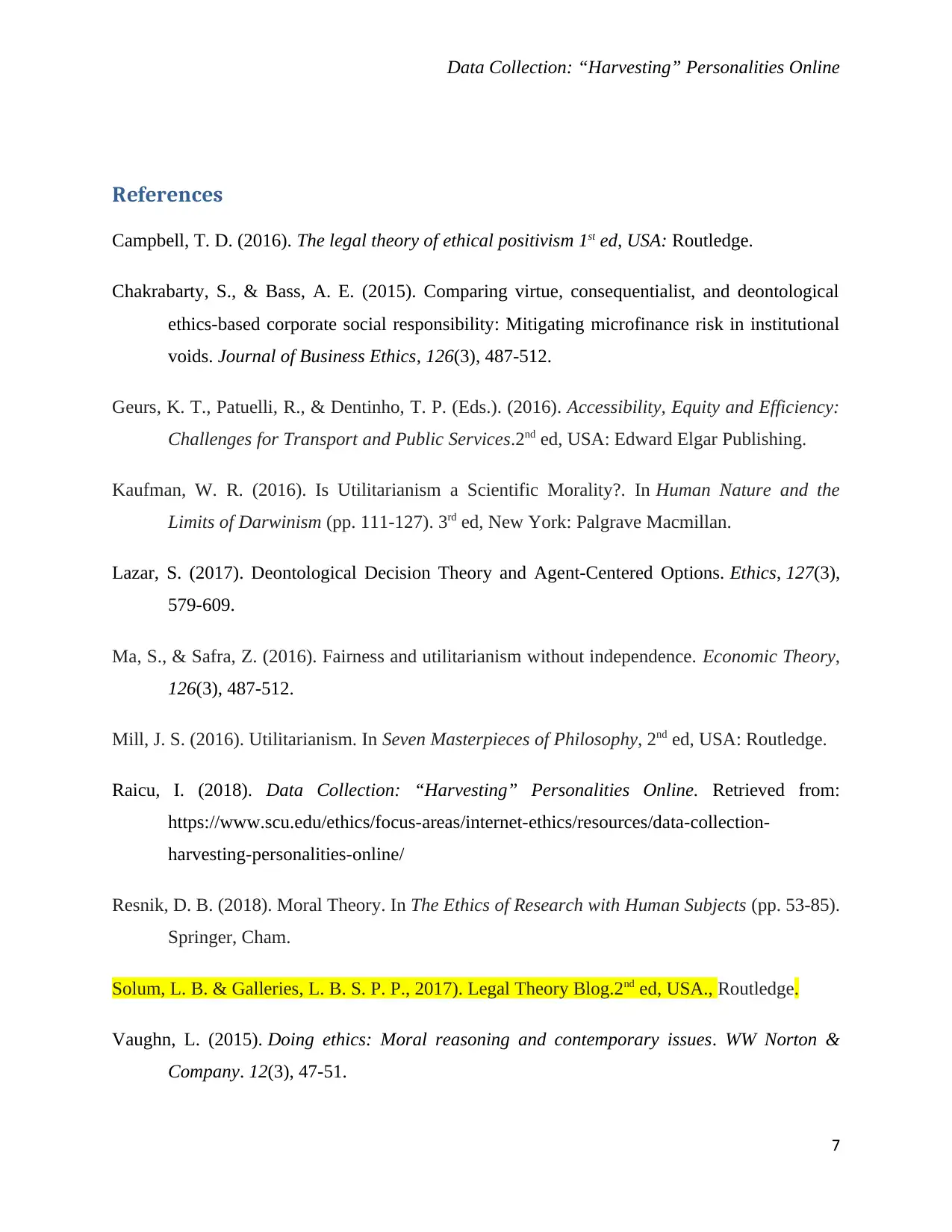
Data Collection: “Harvesting” Personalities Online
References
Campbell, T. D. (2016). The legal theory of ethical positivism 1st ed, USA: Routledge.
Chakrabarty, S., & Bass, A. E. (2015). Comparing virtue, consequentialist, and deontological
ethics-based corporate social responsibility: Mitigating microfinance risk in institutional
voids. Journal of Business Ethics, 126(3), 487-512.
Geurs, K. T., Patuelli, R., & Dentinho, T. P. (Eds.). (2016). Accessibility, Equity and Efficiency:
Challenges for Transport and Public Services.2nd ed, USA: Edward Elgar Publishing.
Kaufman, W. R. (2016). Is Utilitarianism a Scientific Morality?. In Human Nature and the
Limits of Darwinism (pp. 111-127). 3rd ed, New York: Palgrave Macmillan.
Lazar, S. (2017). Deontological Decision Theory and Agent-Centered Options. Ethics, 127(3),
579-609.
Ma, S., & Safra, Z. (2016). Fairness and utilitarianism without independence. Economic Theory,
126(3), 487-512.
Mill, J. S. (2016). Utilitarianism. In Seven Masterpieces of Philosophy, 2nd ed, USA: Routledge.
Raicu, I. (2018). Data Collection: “Harvesting” Personalities Online. Retrieved from:
https://www.scu.edu/ethics/focus-areas/internet-ethics/resources/data-collection-
harvesting-personalities-online/
Resnik, D. B. (2018). Moral Theory. In The Ethics of Research with Human Subjects (pp. 53-85).
Springer, Cham.
Solum, L. B. & Galleries, L. B. S. P. P., 2017). Legal Theory Blog.2nd ed, USA., Routledge.
Vaughn, L. (2015). Doing ethics: Moral reasoning and contemporary issues. WW Norton &
Company. 12(3), 47-51.
7
References
Campbell, T. D. (2016). The legal theory of ethical positivism 1st ed, USA: Routledge.
Chakrabarty, S., & Bass, A. E. (2015). Comparing virtue, consequentialist, and deontological
ethics-based corporate social responsibility: Mitigating microfinance risk in institutional
voids. Journal of Business Ethics, 126(3), 487-512.
Geurs, K. T., Patuelli, R., & Dentinho, T. P. (Eds.). (2016). Accessibility, Equity and Efficiency:
Challenges for Transport and Public Services.2nd ed, USA: Edward Elgar Publishing.
Kaufman, W. R. (2016). Is Utilitarianism a Scientific Morality?. In Human Nature and the
Limits of Darwinism (pp. 111-127). 3rd ed, New York: Palgrave Macmillan.
Lazar, S. (2017). Deontological Decision Theory and Agent-Centered Options. Ethics, 127(3),
579-609.
Ma, S., & Safra, Z. (2016). Fairness and utilitarianism without independence. Economic Theory,
126(3), 487-512.
Mill, J. S. (2016). Utilitarianism. In Seven Masterpieces of Philosophy, 2nd ed, USA: Routledge.
Raicu, I. (2018). Data Collection: “Harvesting” Personalities Online. Retrieved from:
https://www.scu.edu/ethics/focus-areas/internet-ethics/resources/data-collection-
harvesting-personalities-online/
Resnik, D. B. (2018). Moral Theory. In The Ethics of Research with Human Subjects (pp. 53-85).
Springer, Cham.
Solum, L. B. & Galleries, L. B. S. P. P., 2017). Legal Theory Blog.2nd ed, USA., Routledge.
Vaughn, L. (2015). Doing ethics: Moral reasoning and contemporary issues. WW Norton &
Company. 12(3), 47-51.
7
Paraphrase This Document
Need a fresh take? Get an instant paraphrase of this document with our AI Paraphraser
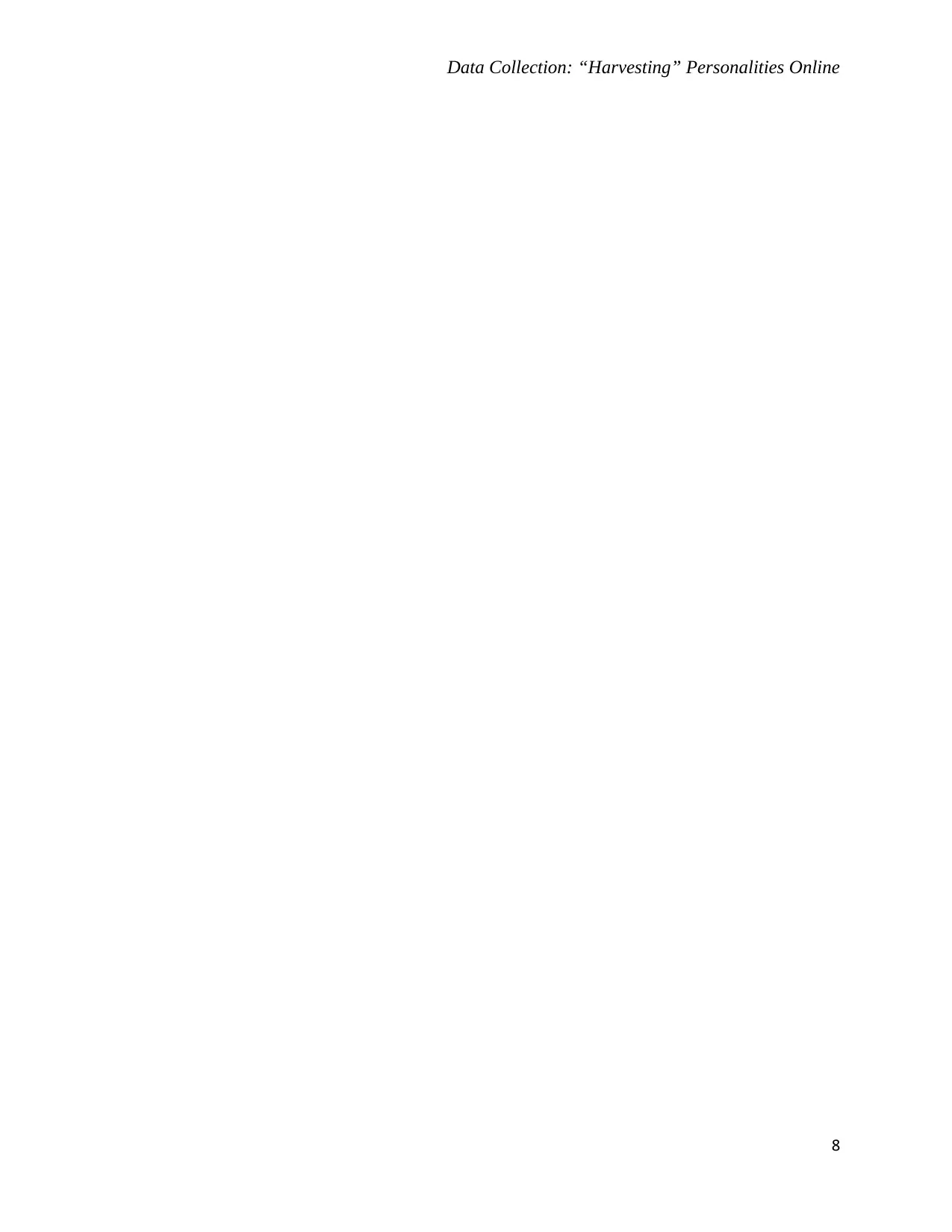
Data Collection: “Harvesting” Personalities Online
8
8
1 out of 8
Related Documents
Your All-in-One AI-Powered Toolkit for Academic Success.
+13062052269
info@desklib.com
Available 24*7 on WhatsApp / Email
![[object Object]](/_next/static/media/star-bottom.7253800d.svg)
Unlock your academic potential
Copyright © 2020–2026 A2Z Services. All Rights Reserved. Developed and managed by ZUCOL.




